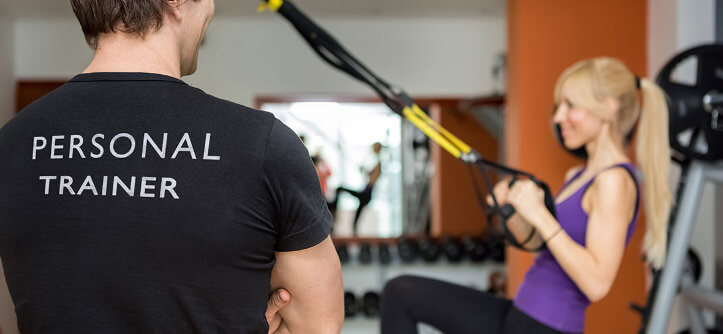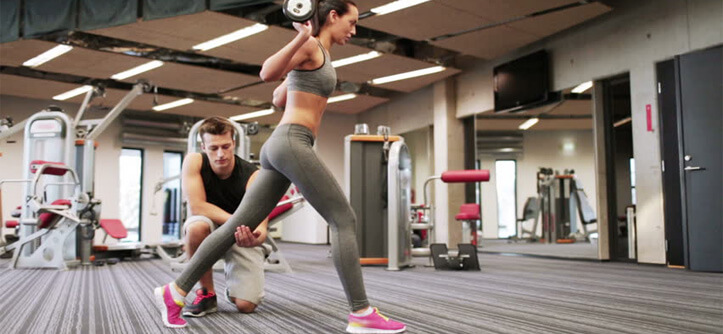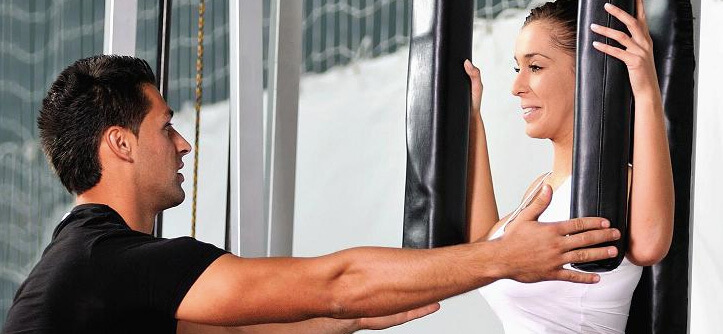Working as a personal trainer is very responsible and requires deep knowledge in this area. A successful coach is constantly evolving. This one attracts a lot of clients, sells a lot of PCs and makes a decent living. The path to high profits in this profession lies through the constant improvement of the level of qualifications.
So, you own a document confirming your qualifications, you have experience in independent studies, and with a coach, experience in sports and sales. Now you are determined to find a job as a personal trainer. The next step is to choose the club in which you would like to work. How to competently approach this issue, I will now tell you.
To begin with, you still need to say that if you want to get a job as a coach in your city, or if you plan to move to a larger city or capital, your actions will be approximately the same - you will have to monitor all the clubs that are in the city and choose from them the ones that you like the most. How to understand whether you like the club or not - try to collect information about it as much as possible. Read customer testimonials, read employee testimonials, try to find information about the working conditions of staff, etc. In the end, just go to this club for the first trial lesson, you have such a right. We talked about this in the article. During this visit, you will just be able to chat with the coach and find out from him the information you are interested in about the club.
AN EXPERIENCE. Keep in mind that online reviews are predominantly negative. Their nature is as follows: negative reviews are usually sucked out of the finger, positive reviews are created by the employer himself. Where is the truth? In different sources and maximum collection of information. Read different sites and different forums, look for acquaintances who went to the club that interests you, or acquaintances who worked there. Once again - collect as much information as possible and keep a very simple thing in your head - you won't know until you try it yourself. Negative feedback can be left by a really bad employee who deserves to be fired, which means that his feedback is not objective. Also, a negative review can be left by a client who bought the cheapest subscription and requires the maximum provision of services. In this case, the client is also wrong. Collect information and filter it. The work of a personal trainer, just like any other, requires the preliminary collection of information about the future place of work.
Work options

Having monitored the market, having collected as much information as possible, call the club, or immediately go there. By phone, you can find out about open vacancies, if any. If not, choose another club. If you are not given specific information on the phone, go straight to the club and ask the administrator at the reception about the opportunity to talk to the manager or director of the club. If not by phone, then during a personal meeting, if there are open vacancies, they will give you all the necessary information on how to get a job as a personal trainer in this club. In any case, even if a personal visit did not give results, you can (after printing it out) leave your resume with a request to transfer it to your superiors, which, of course, I will not refuse you.
Since sooner or later your attempts will still give a result and you will be invited for an interview, the employer will let you know approximately the following information. Any club is a commercial organization, that is, it is a business, the purpose of which is to make money. Your main task as a fitness trainer will be selling personal training (staff) to your clients. How you will sell them, nobody cares. The club evaluates the effectiveness of a coach's work very simply - you sell personal trainers - you are a good trainer, you don't sell personal trainers - you are a shitty trainer. Paradox.
The work of a personal trainer is realized in two ways: either you officially get a job, or you work as a freelance employee. How does it work in practice? 1) Percentage. The club is officially employing you and your salary is the rate (hourly wage) plus the percentage of staff recruited. As a rule, most of the clubs work according to the 50:50 scheme - half of the cost of a personal trainer goes to the club, half is in your pocket; 2) Rent. Its principle is that, firstly, you are not an employee of the club, and secondly, you pay him a certain amount of money for the right to use the equipment and train your clients. At the same time, the price of the personal computer that you named to the client goes entirely into your pocket. Rent can be monthly or one-time. This is the same as in the first case, only you pay not for the whole month, but for each workout separately.
In the first case, when officially applying for a job, you get an entry in the work book and you get experience. In the second case, there is no record, respectively, the experience does not go, and you will not receive a pension when the time comes. How to proceed? Register for a private enterprise (state of emergency, individual entrepreneur, sole proprietor) and pay taxes. Which of these two options will be more profitable is up to you, but experience shows the following. If you are a beginner, and this is exactly the course of events that we are considering, then you do not have clients yet, which means that it makes no sense to be on lease, because the club will not give you clients, and you have not yet recruited your client base. The way out - in any case, it is worth starting your career as a trainer with official employment. So, firstly, you will not bother with finding clients, and secondly, with paying taxes. You will have an hourly rate, percentage, seniority, sick leave, and more. However, both there and there have their pros and cons. But first things first.
AN EXPERIENCE. As a rule, it is very difficult for a beginner to get a job as a coach in a prestigious network club, and for several reasons. Firstly, experienced and already proven coaches are recruited to the luxury and business class clubs. Secondly, such clubs are visited by wealthy clients who are rather finicky and want to see the “coach from the cover”. Thirdly, even if you are hired, it will be difficult for you as a beginner to compete with other trainers who have a well-established cooperation scheme with administrators, and you will have problems getting clients. Way out - look for clubs of the "standard" or "budget" class. The prices for subscriptions are lower there, the cost of staff is also, but as a rule there are more clients and the threshold of requirements for personnel is lower, respectively, it will be easier for a person with no experience to get a job there. And you will eventually be able to grow to luxury clubs and, if you wish, go there to work.
Job interview

You can get a job as a personal trainer only after passing an interview. Directly at the interview, you will first of all need to provide all the necessary documents that are prescribed by labor law, or which the employer informed you about in advance. In addition to your passport or identification code, you will also be required to provide all diplomas, certificates or other documents confirming your qualifications as a person applying for the position of a coach. In any case, be that as it may, whether you have certificates or not, the main thing that you need for an interview is your head, because it often happens that you may not even look at the certificates.
MYTH. In order to get a job as a trainer, you need a military ID. It is not true. Whether you have such a ticket or not is not as important as whether you know how to communicate and sell. Hence the other side of the coin - will a white ticket prevent you from getting a job? Firstly, if you are not asked about it, then you do not need to say that you have it. Secondly, if its presence does not in any way affect the performance of direct official duties, then this will also not affect the outcome of the interview.
In most cases, you will be interviewed by either a unit (gym) manager or a fitness director. As alone, it is possible together with the HR manager (HR department). Keep in mind that the higher the level of the club in which you are interviewing, the more difficult the questions will be, since the requirements for staff in such a club are quite high. At an interview at a mid-range fitness club, it will be easier for you. The essence of the questions or tests that will be given to you, as well as the entire interview as a whole, is to weed out those who clearly do not meet the level of the club at the initial stage. And what kind of questions these will be, it is impossible to say specifically. But for sure, these will be questions from the field of anatomy, physiology, biochemistry, biomechanics and nutritional science. This is one of the answers to the question of how to get a job as a fitness trainer. You need to own the mate part.
Also keep in mind that the question of proximity to the workplace is often raised during the interview. And here you need to understand that if you live close or say that you live close, then most likely you will be pulled about and without reason to appear at work. Whether it's on duty shifts, or if someone from the staff forgets the keys to the club or one of the coaches does not come to the staff, or if a client comes to the club who wants to work with the coach, but they will not be in the club or everyone will be busy ... In such a situation, no matter what you are doing, they will call you and voluntarily ask you to come to the club.
Remember, the interview decides everything. In the interview, you will have to show that you are adequate, that you know how to work in a team and sell. This is essentially all that is required of you. If you demonstrate these qualities, then you may not even be asked about any fitness school diplomas and achievements in sports, let alone a military ID. Often, the employer will conclude whether to hire you or not by just one answer to the key question for any interview - tell us about yourself. The interview may take an hour, but the employer will get the impression of you in less than 30 seconds.
Features of work

So, after passing one, two, three interviews, you were still hired. This is where the fun begins. You are involved in the multifaceted and varied work process of a fitness trainer, which, as we found out in the article, will begin for you as a gym instructor. A few words about who he is (no longer from a theoretical, but from a practical point of view) and then move on to an analysis of the everyday life of a coach.
So, a gym instructor is essentially a serf, or dumbbell giver. Its tasks, in addition to those described in the job description (see article), are to collect scattered inventory for clients, put dumbbells, barbell pancakes, barbells, all kinds of belts with shoulder straps, and so on. The instructor, as an initial stage of development, acts as a loader when you need to bring into the club or take out any equipment or furniture. As a handyman, when you need to adjust the temperature of the boiler in the shower, change the light bulbs in the changing room, hang the shelves at the reception or remove the air conditioner for renovation. The instructor is involved in the most unclaimed events, such as an open day, when you need to conduct personal trainers all day for free, or a trainer's day, when you are required to conduct a free master class. Also, as a rule, all the duty shifts are dumped on the instructor, when you just need to sit out in the hall from bell to bell (hourly) and keep order in the club. Regardless of your achievements, titles, medals and knowledge, you will often start with just such working days. You just need to go through it, as through the initial stage of career development.
ADVICE. Even when you are on duty, do not take your phone with you. Or a tablet, or even more so a laptop. Despite the fact that the shift on duty is rather boring, and as a rule, no one comes to you from the client, you do not need to close yourself off from the outside world by going to a mobile device. First, the employer does not approve of this and may warn you. Secondly, do not forget where and why you came to work. You won't be paid a salary to dig on your phone. If you have already got the duty hours, follow the following rule: if you cannot change the situation, change your attitude towards it. Do not wait for clients to contact you, go to them yourself and start a dialogue. Most of the clients are shy and will not come to you even in case of need. Your task is to be the first to break this barrier and make contact with them. As a coach, you know more, which means that in any exercise that the client does, you can find omissions, which are your direct responsibility to correct. Sociability is your key to personals.
How to get a client

Well, you've done the job of getting a job as a personal trainer. Your next job as a coach is to get a client. A safe bet at the start of your career is constant communication. With everyone. With the staff of the club, with the service personnel and, first of all, with the clients. With free clients, with clients of other trainers, with the trainers themselves. Meet, communicate, find out, ask, advise, advise, and so on. Try to make friends with clients, find out how they are doing at work, how they feel, how their children are doing at school. The most important thing here is sincerity. You need to take an interest sincerely, without falsehood. You should really be interested, otherwise, any person feels deception very well, and where you will try to suck up and get into trust, they will most likely try to avoid communication with you. Be sincere and not intrusive. Be in the right place at the right time. If possible, keep everyone in the room in sight. As soon as you see that the client is experiencing difficulties, be right there and help him solve the problem.
AN EXPERIENCE. People do not always come to the hall for the result. People come to quarrel, make peace, make friends, look for a soul mate, kill time, get away from problems, update photos on Instagram and Facebook feed, be in trend at work, and so on. The work of a coach is in many ways the work of a psychologist. Your task is to understand for what purpose the client came to the club, what worries or worries him. And definitely - to give it to him. It often happens that the coach for the client is the ears. The result is not important to the client, but he will not tell about it, he will buy personal cars in order to tell from time to time that the boss is a fool at work, that his wife eats out brains, that children do not do well at school, that his mother-in-law makes him dig potatoes, and so on. ... Such is the job of a trainer - to sell personal cars. If you want to communicate for life - buy a staff, if you want to meet that brunette over there - buy a staff, if you want me to tell you, or if you want to tell me - buy a staff. Within the walls of a fitness club, you are a coach, the coach's job is to sell time, your time is worth money, and if you want to make money, give the client what he wants.
What else is a coach valued by the management, besides the ability to sell personal cars? - For the fact that he knows how to retain clients. And here everything is just as extremely simple. From a management point of view, each client is a source of income. If a client leaves in a month, he will leave money in another place, but it is not profitable for us, then your task as a coach is to provide the client with such a level of service that will satisfy him so that he continues to go to this club and continues to bring him profit. I repeat - give the client what he wants, be interested in him and keep in touch. Lead the client, track the result, take measurements, take photo fixation. The person will feel that he is needed, that he is cared for. This makes you unique to him. Such a client will stay with you for a long time and will no longer want to train with anyone else.
Conclusion
In this article, you learned how to get a job as a personal trainer, how to choose a club, how they work, where to start when you were hired, and most importantly, how to get clients and keep them. Do not be withdrawn, fight shyness, remove fear and stiffness, and strive to increase your communication skills through constant communication. It is in continuous communication that the secret of a coach's work lies. On duty shift, do not sit in the corner, do not stick into the phone, even if there is only one person in the hall at that moment - go to him and start a dialogue. Your time will pass faster, and perhaps this person will come to you for training. And in the best case, he will also advise you to his friends, relatives or acquaintances.
